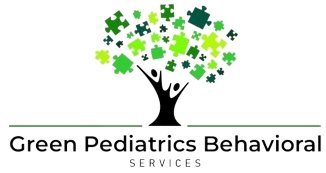Is ABA Therapy Play Based? Unpacking the Fun Side of Effective Learning
When parents first explore Applied Behavior Analysis (ABA) therapy for their child with Autism Spectrum Disorder (ASD), they often have questions about what sessions actually look like. One common and important question we hear at GreenPediatrics Behavioral is: “Is ABA therapy play based?“ The exciting answer is: a significant and highly effective component of modern ABA therapy is indeed play-based!
While some older or more intensive ABA models might have focused heavily on discrete trial training (DTT) at a table, contemporary ABA, especially for younger children, beautifully integrates learning into natural, play-filled activities. As a BCBA-owned and operated provider, we champion these motivating and child-centered approaches.

Why Play is Powerful in ABA Therapy for Autism
BCPlay is the natural language of children. It’s how they explore the world, learn social rules, develop imagination, and practice new skills. Incorporating play into ABA therapy offers numerous benefits:
Reduced Problem Behaviors: When children are happily engaged, challenging behaviors often decrease.
Increased Motivation: Children are more likely to participate and learn when they are engaged in activities they enjoy.
Natural Learning Opportunities: Play provides countless spontaneous moments to teach communication, social interaction, turn-taking, and problem-solving.
Generalization of Skills: Skills learned during play are more easily generalized to other natural environments like home, school, or the playground.
Building Rapport: Play helps build a positive, trusting relationship between the child and the therapist (BCBA or RBT).
How ABA Therapy is Play Based: Key Techniques
So, how exactly is play woven into ABA sessions? Here are some key ways:
- Natural Environment Teaching (NET):
- This is a cornerstone of play-based ABA. NET involves teaching skills within the child’s typical environment and during their ongoing activities, often initiated by the child’s interest.
- Example: If a child reaches for a toy car, the therapist might use that moment to teach them to say “car,” request “push,” or identify its color, all within the context of playing with the car.
- Pivotal Response Training (PRT):
- PRT is a play-based intervention that targets “pivotal” areas of development, such as motivation, responsivity to multiple cues, self-initiations, and self-management.
- How it works in play: The therapist follows the child’s lead, incorporates choices, reinforces attempts, and uses natural reinforcers related to the activity.
- Incidental Teaching:
- Similar to NET, this involves structuring the environment to create learning opportunities based on the child’s interests.
- Example: Placing a desired toy slightly out of reach to encourage the child to request it (vocally, with a sign, or using an AAC device).
- Using Preferred Toys and Activities:
- Therapists identify a child’s favorite toys, games, and activities and use these as a medium for teaching. If a child loves trains, many goals (counting, colors, prepositions, social scripts) can be embedded into train play.
- Embedding Learning into Play Routines:
- Games like “Peek-a-Boo,” “Ring Around the Rosie,” or building with blocks can be used to teach social interaction, imitation, turn-taking, and following directions.
Does This Mean
While ABA therapy is often play based, it’s important to understand that a comprehensive ABA program may also include more structured teaching methods like Discrete Trial Training (DTT), especially for teaching specific foundational skills that might be harder to capture incidentally.
- DTT (Discrete Trial Training): Involves breaking down skills into small, teachable components and teaching them systematically, often in a more structured setting. Even DTT can be made fun with quick pacing, engaging materials, and powerful reinforcement.
- The Balance: A skilled BCBA will determine the right balance of play-based (NET/PRT) and structured (DTT) approaches based on the child’s individual needs, age, and learning goals. For many young children, the emphasis is heavily on play-based methods.
GreenPediatrics Behavioral: Making ABA Fun and Effective
At GreenPediatrics Behavioral, our BCBA-led team believes strongly in the power of play. We strive to create ABA therapy sessions that are:
- Motivating: We tap into your child’s interests.
- Engaging: Learning happens through enjoyable interactions.
- Effective: Play-based methods are evidence-based and produce real results.
- Child-Centered: We follow your child’s lead while gently guiding them towards their goals.
So, when you ask “is ABA therapy play based?” – with GreenPediatrics Behavioral, the answer is a resounding YES, where appropriate and effective for your child’s unique learning journey. We believe learning should be a positive experience.
Want to see how play can unlock your child’s potential? Contact GreenPediatrics Behavioral today to discuss our ABA therapy programs.
